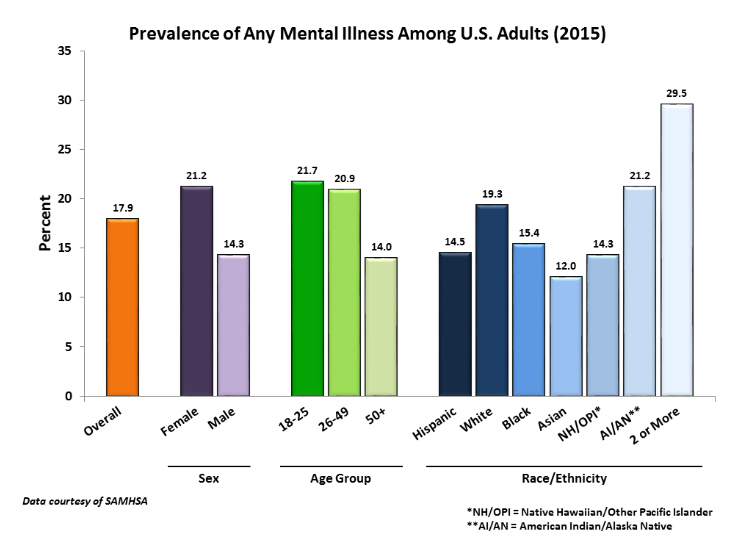You may be aware that suicides among working-aged men are on the rise. While people will make cultural or political hay from that - the last administration killed the middle class, men are under assault in society - one thing is clear: It's a mental health issue and early intervention is important.
Meanwhile, policy makers are in a rush to repeal and replace mental health benefits, basically by saying those are not an ‘essential’ medical benefit. I do not presume to know the mental state of the members of Congress behind this decision, but here is what a cursory look at mental health in the United States shows us.

The prevalence of mental illness is 17.5 percent, as per the National Institute of Mental Health. To give this perspective, heart disease is present in about 23% of our population.
Funding for mental health services at the state and local level received large federal supplements. Yet among the 56.5 percent of adults who received no care, 22.94 percent, nearly half, still could not afford it.
And once mental health facilities became the targets of books and movies as worse than the diseases, prisons became our mental health facilities instead. 1.2 million adults with mental illness are now incarcerated. From the National Review:
For all the attention devoted to police-involved shootings and race, mental illness is the more salient issue. A joint report by the Treatment Advocacy Center and National Sheriffs’ Association in 2013 examined cases between 1980 and 2008, and estimated that roughly half involved people with mental illness. A Washington Post analysis of 1,000 fatal police shootings in 2015 puts it at about a quarter. These shootings are another tragic symptom of our contemptible outsourcing of the severely mentally ill to law enforcement. The police are our de facto front-line mental-health workers — “armed social workers” in the pungent phrase of one observer — and jails are our de facto psychiatric-hospital system.
Congress has their health care plan; and requires that they have "Gold" coverage - the best and most expensive, to receive a subsidy from their employer (taxpayers - you and me). All of those plans provide mental health benefits.
The prevalence of mental health issues and their impact on patients and society treating mental health are why Congress provides mental health benefits to themselves. It is an essential ‘benefit’ for them.
Why not anyone else?
The prevalence of diabetes in the United States is about 9.3%, far less than the prevalence of mental health issues. Do you think any legislator can make a reasonable argument that health insurance shouldn’t cover diabetes because it will 'raise the costs' for everyone else?




